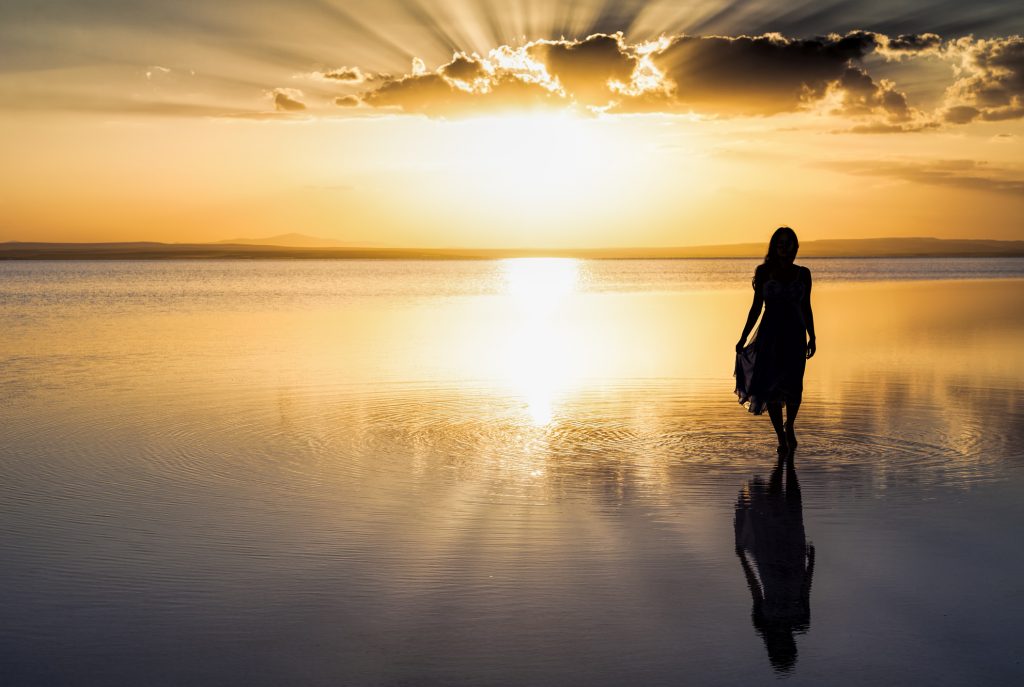
Mass readings for the 19th Sunday in Ordinary Time:
1 Kings 19.9, 11-13 Psalm 85.8-13 Romans 9.1-5 Matthew 14.22-33
Did Jesus really walk on water?
I believe he did, and I do so in agreement with what C.S. Lewis argued in terms of the Christian story as “myth.” Yes, it’s a myth, but it’s a true myth. Every mythic story of the ancient world touching upon the idea of God’s incarnation and work of reconciliation and redemption of humanity, especially those of the Hebrew scriptures, finds its fulfilment, its expression in history in Jesus. The miracles, including this one, are part of a pattern of fulfilment; and everything that Jesus does, we then as the Church, in our own way are capable of doing.
We might not be able to multiply loaves and fish, but we as the Church, the body of Christ in the world, can and do feed multitudes both literally through food banks, soup kitchens, food aid to those in the grip of famine, but also figuratively, that is, spiritually we nourish ourselves, and hopefully, those who come to us.
So, does today’s story mean that we can all walk on water, or ought to be able to? Is this really an expectation of ancient prophecy, a fulfilment of the promise of Israel in Christ and his Church?
Now, this is not an expectation of the Hebrew prophets, or something expressed in the Torah. There is a small reference in Job to God as one who walks upon the waves – and that might connect to Jesus; but we also know that in Greek myth, Orion (yes, the one who’s constellation most people can pick out on a starry night) walked on water; and he too was a divine son. Is this what’s being referenced? So, does Jesus do this to prove who he is?
Growing up in the seventies, I remember my father, for many a Holy Week, would loudly play the soundtrack from the musical Jesus Christ Superstar in our house. While there are many great songs in that show, the line that has stuck with me came from what Herod sang when the arrested Jesus is brought to him. Prince Herod sang,
So, if you are the Christ, yes, the great Jesus Christ
Prove to me that you’re no fool, walk across my swimming pool
If you do that for me, then I’ll let you go free
C’mon, king of the Jews!
For me that expresses the reason why Jesus’ walking on water is not done to prove his divinity. Jesus doesn’t play those games with sceptics like Herod. No, he’s trying to show us the faithful, as he would in a parable, something more. There are depths to its significance that make it important that Jesus does this. It’s more than a demonstration of his power over nature – he’s done that already by calming a storm on the Lake of Galilee to the astonishment of his disciples – no, Jesus is here making another point; and it’s one that get’s particular emphasis when Peter steps out of his boat to join Jesus. The impossibility of walking on water becomes a possibility, even if we see Peter fail at it.
So, what is the meaning of walking on water? We have, as the Church, long reflected on the meaning of the feeding miracles and applied our insights to the celebration of the Eucharist. I consecrate the Eucharist with this community, and there is a miracle in what is happening, but it isn’t exactly what Jesus did for five thousand hungry families, yet we know there’s a connection.
With respect to walking on water, what then is the corresponding action for us? Well, let’s go back to that first question: what does walking on water mean?
Well, what is the meaning of water in the imagination of the first century person? For that matter, what is it for us today? I think in this regard, we have a lot in common with our ancestors.
In the ancient mind water was a source of life, but found in great bodies, like the Lake of Galilee, like the Mediterranean Sea, like the Atlantic and Indian Oceans in all their vastness, all of these being known to the disciples as part of the acknowledged geography of the world, these bodies of water, in their breadth, but more so in their practically unfathomable depths, were terrifying embodiments of chaos.
When a ship sank it was swallowed up, and drawn into a darkness from which it would never return. The sea occasionally gave up its dead, the drowned being washed ashore, but their manner of death was surely as terrifying then as it is today. And yet, fishermen went out daily, and ships carried cargos across those same mysterious depths day after day. Indeed, as many an historical-geographer will point out, those who could master the seas and the waterways became the great powers of the world. The land-locked, and those, such as the nations of Africa, lacking deepwater harbours and navigable rivers found their ambitions for greater wealth and technological development through trade and exploration stymied.
At the level of symbolic language, we then understand that those who can master their fear of chaos, and learn instead how to navigate upon it and not be drawn into it, will be masters of this world.
So, for us, the Church, this is very much what is being suggested to us. We can deal with the chaos of the world without being drawn into it; but it requires the mastery of our fears, and we control those by faith in Christ.
I was away this past week; and as part of my few days of rest and recreation I took along some reading, including a history of the period between the end of the First World War and the beginning of the Great Depression. That period of world history, I could not help but think, bears much resemblance to our times – in the wake of a global trauma, in that case, a world war, the leading nations of the world, with exception of the U.S., found themselves deeply in debt. The peace that the victors thought they had secured very quickly looked quite fragile. Almost obsessively, there are movements to secure the peace through disarmament treaties, through the development of a world forum in the League of Nations, as well as frequent conferences to sort out the world economy that was severely compromised by massive debt. Layered upon that was social and political upheaval of a kind that we are seeing today. If you are at all familiar with this history, you will also know that the Great Depression was not the only economic event of that time; but there where cycles of both inflation and deflation, political and military crises that sent stock markets diving and soaring, unemployment crises that came long before the famous market crash of 1929. That is, to have lived then was to be in the midst of worldwide chaos on a scale never before experienced.
And, of course, the tragedy of that time was that the failure to resolve any of the great issues of the day, and so, the world sank into the dark depths of chaos again as war enveloped the globe.

The global issues are different now, but the need to rise and stay above the chaos remains; God is the one whose spirit moved across the primordial sea of chaos and drew from it so as to create the universe. God does not descend into the depths of it, but rather summons what is needed and it brings it into the light. As we look around at the pressing issues, many of them economic, but also social and cultural, we need to find a way to stay above it, and like Christ, rescue others from it.
And that will be first and foremost a work of faith; of prayer and a reliance on God’s grace above all else.
The great temptation, and I sense it preying on me, is to in fear and panic, begin to run around trying to fix everything all at once, when really I need to simply put one foot in front of the other and walk to Jesus. So, what we need to do here in Dundas, in Hamilton, in Ontario and in Canada, in the midst of the chaos of our world, must be done with our eyes fixed on our Lord, receiving his calmness, his confidence, so that we can move patiently one step at a time over the dark, roiling deeps.
And so, we are beginning in this parish to put together a ministry to children, training parishioners as children’s catechists; in developing our compassionate care ministry to better address the mental health challenges of our community; in encouraging and celebrating the work of our societies and fraternities like St. Vincent de Paul, the Knights of Columbus, the CWL, and so on. In working to make our devotion in worship beautiful and meaningful and truly an experience of communion in Christ, because it is in the Eucharist we have the source of our faith and a summit from which we can survey our world like a lookout atop a mast, scanning the waters for coming hazards, and searching for those lost at sea, moving across the face of the deeps, mindful of the peril but no longer afraid.
Amen.